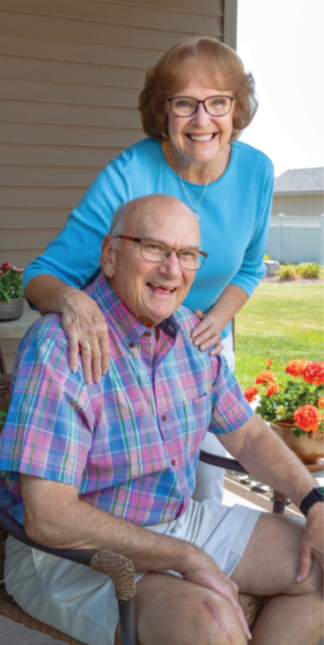On the right course to healing: Complete heart attack care, from ER to rehab
After quadruple heart bypass, a new lease on life. A healed heart and a grateful patient.
 Tom MacGilvray had been having chest pain off and on for a few weeks. But every time, the dull ache in the center of his chest passed after a few minutes of rest.
Tom MacGilvray had been having chest pain off and on for a few weeks. But every time, the dull ache in the center of his chest passed after a few minutes of rest.
“I thought, ‘Maybe I’m out of shape,’” MacGilvray, 74, of Bourbonnais, recalls thinking after one such episode.
Then came the night of his grandchild’s birthday party. He went to bed after everyone left but was awakened an hour later by chest pain. He tried waiting it out, but this time his symptoms didn’t pass.
“I said, ‘I’m not going to sit here and die in my living room in this easy chair,’” he says. “I told my wife, ‘I think we should have this checked out.’”
Help for an ailing heart
MacGilvray arrived at Riverside’s emergency department in the wee hours that Saturday morning. Tests showed he was having a heart attack.
“We started him quickly on medical therapy,” says Riverside cardiologist Vikas Patel, MD. “We started thinning his blood to reduce the chance of any progression of his heart attack, and we controlled his symptoms.”
MacGilvray’s symptoms improved quickly, but he wasn’t out of the woods. A coronary angiogram revealed partial blockages and one complete obstruction of the arteries that supply blood to the heart. MacGilvray had a less-severe type of heart attack, known as a non-STEMI heart attack, Dr. Patel explains. Dr. Patel recommended coronary artery bypass surgery graft (CABG) to treat the narrowed areas of MacGilvray’s arteries and improve his heart’s blood supply.
In CABG, healthy blood vessels taken from the chest, leg or arm are attached below and above the narrowed arteries so that blood can flow around the obstructions. Another option for improving blood flow is coronary angioplasty and stenting. In that procedure, mesh devices are placed in the arteries to keep them open after they have been widened with a balloon catheter.
Dr. Patel explains that bypass surgery was a better option because MacGilvray was relatively healthy, and his blockages would have required several stents. “When you have that, it’s better to go for surgery, because the long-term results can be better,” Dr. Patel says.
The following day, MacGilvray underwent quadruple bypass surgery performed by cardiothoracic surgeon Philip Alexander, MD. Dr. Alexander bypassed four of the clogged arteries supplying blood to MacGilvray’s heart.
“Dr. Alexander did a wonderful job,” MacGilvray says.
MacGilvray left the hospital just four days later and was admitted to Riverside’s home health services Remote Patient Monitoring Program. During his home health episode of care, the home health nurse provided care and monitoring helping to make the transition from hospital to home as safe and as smooth as possible. Shortly after home health services began, the nurse identified high-risk symptoms/concerns; he was in Afib and the surgeon was notified. Mr. MacGilvray was started on anticoagulation therapy, medications were adjusted, and labs were obtained. With home health care, he was able to remain at home safely and avoid hospitalization.
Soon afterward, he started cardiac rehabilitation (rehab) at Riverside’s Bourbonnais facility. Cardiac rehab includes several weeks of monitored exercise to help people recover after major heart events or surgeries.
“I feel pretty good,” MacGilvray says. “I think it’s working.”
Places to be, things to do
Halfway through his rehab, MacGilvray was looking forward to traveling with his wife, Darlene, and golfing again. “I’ve got four grandkids to keep up with,” he adds. He’s even working on improving his diet, with support from Riverside.
MacGilvray has a grateful heart when it comes to his Riverside team, whom he credits with saving his life.
“Thank you for the wonderful care,” he says, adding that he experienced seamless, comfortable and informed care.
“I felt like I was on the road to recovery five minutes into the process,” MacGilvray says.
Complete cardiac care

Riverside offers 24/7 heart attack care as well as advanced cardiac procedures, including open-heart bypass surgery, minimally invasive transcatheter aortic valve replacement and the Watchman procedure to reduce the risk of stroke in atrial fibrillation patients. “We have excellent outcomes,” says cardiologist Vikas Patel, MD. Learn more about Riverside’s Heart & Vascular services.
